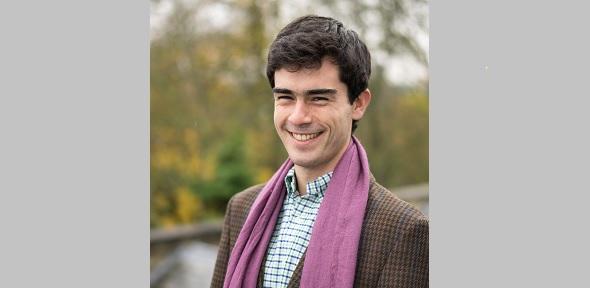
Date in FIBE: 2016-2021 FIBE Cohort: 3
Before joining FIBE: I previously studied Mechanical Engineering with focus on Renewable Energy technologies at the University of Edinburgh. Through a 4th Year placement scheme I worked for Building Services Engineering consultants Max Fordham, which gave me my first real insight into how energy is used in our homes and places of work – an experience that would spark an ongoing interest in the subject. In the year between graduating from Edinburgh and joining FIBE I worked at the United Nations University (an in-house research arm of the UN) as a Junior Fellow in the Office of the Rector in Tokyo, Japan.
PhD Research
Thesis title: A Social Logic of Energy: A data science approach to understanding & modelling energy transitions of India’s urban poor.
The problem investigated: Indoor air pollution - that is smoke from burning solid cooking fuel in homes - killed approximately 600,000 people in India in 2019. Despite many different initiatives over recent years to promote improved stoves and cleaner fuels, almost half of households still rely on some solid biomass fuel. In cities, low-income households can face many different barriers to adopting cleaner fuel that can lead to some households slipping through the net of one-size-fits-all policies. My thesis explored how data science approaches could be used to understand the influence of social factors and household practices on clean cooking transition, and in turn how this knowledge could be used to leverage public data to model cooking fuel access at a city scale.
Main conclusions: The conclusions of my research contributed both to an understanding of urban energy transitions, and the design of modelling approaches for energy transition in urban households. Using a novel clustering-based approach I showed that low-income households are distinctly heterogenous in their energy use, and identified key typologies of low-income households each with unique non-income barriers to adoption of cleaner fuels that need to be targeted by policies. I also demonstrated how microsimulation models combined with Bayesian approaches could be used to generate high resolution neighbourhood-level cooking fuel access metrics using only aggregated public data. I was able to secure further funding to use this model to develop an interactive policy support tool (aduppu.org) for locally targeting interventions which is being used by policy makers and stakeholders in Bangalore.
Key publications:
Neto-Bradley, A., Choudhary, R., & Challenor, P. (2022). A microsimulation of spatial inequality in energy access: A Bayesian multi-level modelling approach for urban India. Environment and Planning B: Urban Analytics and City Science
Neto-Bradley, A., Rangarajan, R., Choudhary, R., & Bazaz, A. (2021). A clustering approach to clean cooking transition pathways for low-income households in Bangalore. Sustainable Cities and Society, 66
Neto-Bradley, A., Choudhary, R., & Bazaz, A. (2020). Slipping through the net: Can data science approaches help target clean cooking policy interventions?. Energy Policy, 144
Why did you join FIBE and how did it help? Climate change is very much the existential risk our generation faces and changing our energy system is key to addressing it – I knew I wanted to work on this. FIBE’s MRes year gave me the time and space to make the connections, gain exposure to to new ideas, and scope out a unique and novel project with strong interdisciplinary grounding and international collaboration. But more than this FIBE CDT was also an academic family and community with diverse interests and far-ranging expertise that kindled creativity and ingenuity, with unique opportunities for collaboration and perhaps more importantly friendship.
What are you doing now? I am now working as a Senior Energy Advisor at the Department of Business, Energy and Industrial Strategy (BEIS). In my current role I work to carry out and commission research on energy efficiency in homes to support policy teams in working to address the risks of climate change and meet the UK’s Net Zero ambitions.
Email contact: apn30@cam.ac.uk | andrepaul.netobradley@beis.gov.uk

